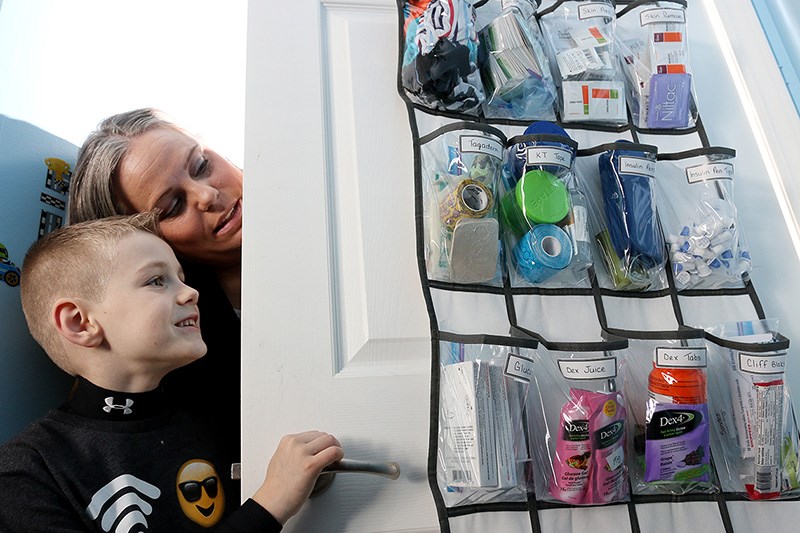Nicholas Legge loves playing soccer so much he brings his ball to school every day. He also enjoys karate, baseball and riding his bike.
Normal kid stuff, right?
What's not normal for a six-year-old are near-death experiences due to mismanaged insulin.
Nicholas, a Grade 1 student at Lincoln elementary in Port Coquitlam, has had a couple of those since being diagnosed with Type 1 diabetes when he was two years old, and his mom, Cindy Legge, is afraid it could happen again if he can’t get a new insulin pump.
She has embarked on a fundraising campaign to help Nicholas get one as the family can’t afford the $5,000 cost plus the several thousands of dollars more it costs every year for attendant supplies like cannulas, cartridges and infusion kits. The Legges recently hosted a burger and beer night at a local pub, and several neighbourhood moms pitched in to run a pop-up coffee shop one morning in front of Nicholas’ school.
Insulin pumps have been available to children under the age of 18 through British Columbia’s Fair PharmaCare program since 2008. That coverage was expanded in 2014 to include young adults under the age of 25, and then all age restrictions were eliminated last year. But the government program only pays for one brand of pump, Ominipod, of the two currently available in the province.
Nicholas has had his current pump, manufactured by Animas, since he was two. But it’s nearing the end of its five-year warranty period and the company has withdrawn from the insulin pump business.
That has left Legge’s family with the option of the Omnipod, which she said doesn’t suit her son’s needs, or a pump from the Minneapolis-based company Medtronic, which is closer to the pump he’s already using. A third pump option, the Tandem t:slim X2, has just been approved by Health Canada but has yet to hit the market in a widespread way.
Legge said the hoops that need to be jumped through to get PharmaCare to sign off on paying for a pump that’s not an Omnipod are considerable, and generally require a clinical reason approved by his endocrinologist. She said Nicholas’ inability to use an Omnipod comes down to a sensitivity to the glue that is used to adhere the device to the skin and a system for setting the basal rate that delivers insulin that is unfamiliar to her son.
“That’s really left us in a predicament,” Legge said, adding other provinces with funding for insulin pumps, like Alberta, don’t limit it to just one brand of pump, so users can decide which system works best for their needs.
Joan King, the manager of government relations and advocacy for Diabetes Canada, said public coverage of insulin pumps is inconsistent across Canada. Several provinces — including Quebec and Nova Scotia — still have age restrictions while others such as Ontario have specific eligibility criteria that must be met.
“The high cost of insulin pumps and pump supplies is a barrier for access for many Canadians living with Type 1 diabetes,” King said.
Legge said Nicholas’ disease costs her family about $19,000 every year. Private health care plans cover part of that up until a cap and PharmaCare covers part, but the remainder often means the family has to make a choice between purchasing diabetes supplies or registering Nicholas or his sister in activities.
“Everything is based on having enough medical stuff,” Legge said, adding the good intentions of government support for insulin pumps have proved to be anything but for her family.
“It’s a move in the right direction,” she said, “but you don’t have a choice anymore. It’s like they didn’t take into account what this disease is.”
Brooke Forbes, a public affairs officer for B.C.'s health ministry, said the province undertook a “competitive value process” when it expanded its pump program to ensure it provided the best value for products. She said between July 2018 and January, 550 special authority requests for the alternate pump by Medtronic were approved.
Forbes said in 2017/’18, PharmaCare spent $2.26 million for insulin pumps and another $5.01 million for pump supplies. The expanded coverage to all ages will boost that to approximately $15 million over three years.
King said Diabetes Canada advocates for people living with Type 1 by meeting with elected officials, as well as hosting awareness days to educate them on the latest diabetes treatments and research.
Legge said Nicholas has taken his disease in stride — be has no choice. But its challenges are neverending, right down to making arrangements for play dates with his buddies.
“There’s never really a break,” she said.



